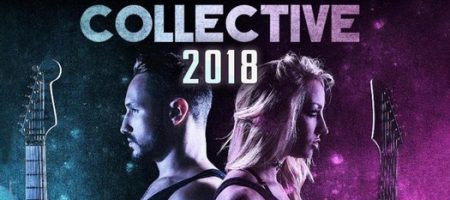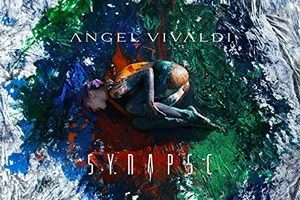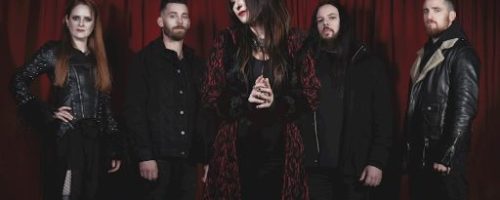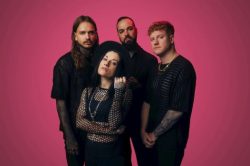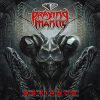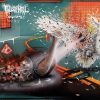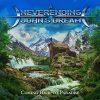Angel Vivaldi – Synaptic Connections
Tuesday, 28th November 2017
While Angel Vivaldi might not be the absolute first name that one thinks of when it comes to instrumental shredding guitar acts, he has no doubt been gaining ground with each new release since his first release, Revelations. Since then, his name has continued to soar among the guitar shredding community, as well as the metal community as a whole, due to his involvement with acts like Vext (and contributing to side-projects like I, Legion) along the way. Deserving of his rising star status within the genre, he is also boosted by some fantastic live performances.
Synapse is his latest release, and another concept record. This one based on the brain and neurotransmitters. It pulls from multiple genres to fit the mood of each particular neurotransmitter along the way, and Vivaldi went great lengths to make sure the concept was being visualized at 110% – going so far as to repaint and redecorate the studio before recording each of the album’s tracks. The results speak for themselves, with an album that features some stunning guitarwork, but more importantly, some emotional resonance and sheer enjoyment factor. Something that his contemporaries sorely lack in. We checked in with Vivaldi before he hit the road for a US run in early November to talk Synapse, instrumental music, and even his volunteer work over the years.
Dead Rhetoric: In regard to Synapse, one of the things that I thought was kind of cool was that you painted the studio for each song. Could you go into that a little bit?
Angel Vivaldi: Because it was a concept record about the brain, and emotions, and all of our neurotransmitters, I decided to have full immersion into the whole songwriting process, just to remind myself of the intentions behind every song. For instance, “Serotonin” is a very upbeat song, very fun, very high energy. So I wanted to take a color to match that same dynamic. I chose green as an example. When you have a big green wall in front of you and you are surrounded by plants – I decorated the room differently each time – it reminded me of my intention every single time, so I didn’t get side-tracked. You are putting in the same energy that you are surrounded with. So I did that for each song. I’m really into interior design, and it was really overwhelming but I wanted that full immersion.
Dead Rhetoric: How did you choose the different neurotransmitters and things like that?
Vivaldi: We have countless neurotransmitters that are flowing through us, but I wanted to choose the ones that were (a) familiar, and (b) responsible for something that was very defined and clear for the most part. There’s definitely a gray area between different neurotransmitters, but serotonin, dopamine…people are familiar with them, or at least familiar enough to be at least inquisitive or maybe look them up. Luckily for me, with my fanbase, they are incredibly intelligent and inquisitive. They are very curious. Once they see a pattern of a concept, they will kind of go out and educate themselves a little bit so that they understand what my motive was.
Dead Rhetoric: When you are making instrumental music, what do you feel the differences are in contrast to someone who is a part of a band, or when there is a focus on vocals?
Vivaldi: I think that instrumental music in particular, one of the reasons that I am drawn to it, across different genres – be it electronic music or acoustic guitar – is that the listener can interpret it the way that they want based on the dynamic and the feel of the song itself. My approach to instrumental music…it takes me a long time to write a song because there are certain sections that are fast and brisk, but I don’t really play a note for the sake of playing the note because I can.
It’s very strategic – it has to have a purpose, it has to serve the song. Really, that’s the most important thing. It’s not a matter of the lead, there’s a lot of other things happening in my music in particular, that I kind of want to support. Whether it’s a bass line, a drum section, or whatever it may be. So it takes a long time, for that reason. But I’m a really patient guy. I’ll wait. Some of these songs, they took 3-4 years since the ideas where first sitting around. It’s worth it to wait for that second that you can go, “That’s the one!” It’s irrefutable. There’s no settling. For me, it’s an extremely well-thought out process.
Dead Rhetoric: So how do you go about putting the emotional side into the music? You can play some incredible stuff on guitar, but there’s still that emotive side to it. How is that balanced within the structures?
Vivaldi: I think for me, it’s a matter of being really sincere and authentic. Being focused on the concept at hand. I love doing concept records. The last three releases I did were concept records, and I probably will continue to do them as well. It’s a matter of coming up for air, and it goes back to what I said about serving the song. You can play a million miles a second and just go on autopilot for that stuff. It’s a matter of saying something. I think a lot of guitarists these days have a lot to say. However, they are just zipping through…it’s like someone who doesn’t shut up in a conversation. Which is fine – some people can be really engaged by that. It’s actually something that I’m sure appeals to some listeners of a particular artist.
But I think most people, they like to have a bit of a gap in a conversation, or a gap in a story. It’s like peaks and valleys, so to speak. For me, with how I approach the guitar, and using the whammy bar to try and emote a little bit differently and do really nice soaring melodies that are memorable and hummable…I think that’s the biggest thing – captivating people from that melodic approach.
Dead Rhetoric: Is there a challenge in writing an instrumental track then, to provide those hooks? Instead of having to rely on a vocal to do it.
Vivaldi: The way that I look at it is this – it’s kind of like a language. If someone came up to you speaking Mandarin, and if you don’t speak Mandarin, you have no idea what they are saying. But it doesn’t mean that they aren’t saying anything. I think the same thing applies to instrumental music in particular. We may be playing, and people who don’t get instrumental music are like, “Oh, it’s just a bunch of guitar solos” but it’s really not. It’s based on phrasing. The same way that we speak with phrases. It’s a parallel in guitar playing. I think it’s like a frequency that people are tuned to.
A good example is a ballad I wrote called “Sea of Heartbreak.” It’s a very emotional and dynamic song, but uplifting…kind of bittersweet. Most people who listen to that song understand what I’m saying. They can relate to it on some level. But the beautiful thing that’s underlying with that, is that it may be a sad or uplifting song, but to me it could have been about a heartbreak…to someone else, it could have been about their dog dying, or losing their job. It’s kind of cool to have that emotional gray area. I’m just giving a dynamic and you can enjoy it whatever way you feel is fit for you at that time when you are listening to it.
Dead Rhetoric: So you are giving them a little more ownership of it to make it their own.
Vivaldi: Absolutely, yeah. Beautifully put.
Dead Rhetoric: In some ways, it’s almost like there are different types of listeners. Like you said, some people hear instrumental stuff and just can’t get into it. Do you see that difference in listenership?
Vivaldi: I think that a lot of people are just so conditioned to the format of having vocals that they can’t relate to it [instrumental music]. There’s absolutely nothing wrong with it – there are enough vocal bands to go around and satiate that need, but I feel that with guitar instrumental, with it being such a popular genre nowadays, I think that there’s enough instrumentalists to go around to that you can find one that says what you want them to say. There’s always someone doing this or doing that, and it’s always easy to relate on that level.
Guitar instrumental is a blanket term. There’s jazz guitar instrumental, there’s metal guitar instrumental, there’s pop, EDM. I think the big thing nowadays is being consistent. Fortunately or unfortunately, I don’t subscribe to that. I have my ballads, I have my metal songs, my indie rock songs, my progressive songs. I guess there’s a lot for everyone out there, but I’m influenced by a lot of different types of music; I do what I want. That’s what keeps my music a little more sincere than maybe someone else’s. It really is written for myself. If you relate to it, then great. If not, that’s okay too.
Dead Rhetoric: With your music, you have all these different backgrounds, but it’s wrapped together with your own playing style, which gives it more of it’s own sound in a sense.
Vivaldi: I think that guitar is a voice. When you hear Malmsteen play, you know it’s him no matter who he is playing over. If it’s Satriani, you know it’s him. I think that identity, with the new and younger generation of guitarists, it doesn’t seem like they are really concerned with that. They are concerned with trends, and not so much an identity, so you have a lot of copycats. You have a lot of overlap. Even with more well-known instrumental acts, it seems that way these days. But I don’t subscribe to that – I do what I want to do. I’m lucky to be in a position where I’m not on a label. I don’t have anyone telling me that I can’t do something. I just work on my own and can be artistically satisfied with my work.
Dead Rhetoric: I hadn’t seen you live until last year when I saw your set at the New England Metal Fest last year. I was kind of blown away with the amount of showmanship you had in the live setting. How important is that aspect when you are playing live?
Vivaldi: Extremely. My philosophy is this: If you want to hear the record perfectly, go listen to the record. It exists. You can enjoy it that way. But I’m a performer. I’m an entertainer. I guess I’m old school in that sense, where I like the big productions. Seeing Alice Cooper or Iron Maiden. Those were shows. You left there feeling inspired. When the house lights go on and the show’s over, it’s like you were in a different world. You are then taken back to reality. For my live performances, I want them to see me having a good time. Then they are going to have a good time.
There’s also an element of surprise. The unpredictability of, “What is he going to do on this tour?” I balance it – all the melodies and the songs are played the way they are on the record. But sometimes I’ll extend a section to improvise or showboat a little bit. That pushes me. A lot of those things are not easy to do. I want to show people that I am putting thought and time into giving them a good show that they are going to remember and leave saying, “That was really cool. I didn’t expect that.” I think a lot of bands have their own priorities. If they want to stand there and play flawlessly – every single note as it was played, that’s perfectly fine. There’s obviously an audience that really enjoys that. But for me, I want to put on a nice, old school rock show.
Pages: 1 2












